写给新手的SpringBoot完整教程——04SpringBoot数据访问篇
写给新手的SpringBoot完整教程——04SpringBoot数据访问篇
-
- 一.JDBC与MySQL使用
-
- 1.连接演示
- 2.浅析原理
-
- I.DataSourceConfiguration(介绍数据源如何得到)
- II.DataSourceAutoConfiguration(介绍如何实现执行sql)
- 3.使用JdbcTemplate来操作数据库
- 二.整合Druid数据源
- 三.整合Mybatis
-
- 1.配置相关
- 2.基于注解的讲解
- 3.基于XML的讲解
- 四.整合JPA
一.JDBC与MySQL使用
首先使用SpringBoot Initializer来快速创建一个Web项目。创建完后在我们的Pom文件,关键依赖是:
<parent>
<groupId>org.springframework.bootgroupId>
<artifactId>spring-boot-starter-parentartifactId>
<version>1.5.9.RELEASEversion>
<relativePath/>
parent>
<dependencies>
<dependency>
<groupId>mysqlgroupId>
<artifactId>mysql-connector-javaartifactId>
<scope>runtimescope>
dependency>
<dependency>
<groupId>org.springframework.bootgroupId>
<artifactId>spring-boot-starter-jdbcartifactId>
dependency>
<dependency>
<groupId>org.springframework.bootgroupId>
<artifactId>spring-boot-starter-webartifactId>
dependency>
<dependency>
<groupId>org.springframework.bootgroupId>
<artifactId>spring-boot-starter-testartifactId>
<scope>testscope>
dependency>
dependencies>
<build>
<plugins>
<plugin>
<groupId>org.springframework.bootgroupId>
<artifactId>spring-boot-maven-pluginartifactId>
plugin>
plugins>
build>
这里给出本教程最开始的初始项目:
链接:https://pan.baidu.com/s/1rYb4WQEA4ZgJOaO1XWt_Gw
提取码:6bml
1.连接演示
下载好了项目后我们需要在application.yml文件里面加入下面内容(根据自己的实际环境来配置):
spring:
datasource:
username: root
password: 123456
url: jdbc:mysql://localhost:3306/db_course
driver-class-name: com.mysql.jdbc.Driver
接下来我们运行测试文件DatademoApplicationTests如下,说明测试成功:

再演示另外的一个功能:
首先添加下面文件

sql文件内容如下:
/*
Navicat MySQL Data Transfer
Source Server : 本地
Source Server Version : 50528
Source Host : 127.0.0.1:3306
Source Database : restful_crud
Target Server Type : MYSQL
Target Server Version : 50528
File Encoding : 65001
Date: 2018-03-05 10:41:40
*/
SET FOREIGN_KEY_CHECKS=0;
-- ----------------------------
-- Table structure for department
-- ----------------------------
DROP TABLE IF EXISTS `department`;
CREATE TABLE `department` (
`id` int(11) NOT NULL AUTO_INCREMENT,
`departmentName` varchar(255) DEFAULT NULL,
PRIMARY KEY (`id`)
) ENGINE=InnoDB AUTO_INCREMENT=1 DEFAULT CHARSET=utf8;
2.浅析原理
I.DataSourceConfiguration(介绍数据源如何得到)
这里我需要稍微来讲一下原理(不感兴趣可以跳过):
我们在运行时,这里的dataSource的默认注入的是:
org.apache.tomcat.jdbc.pool.DataSource作为数据源;而有关数据源的相关配置都在DataSourceProperties这个类里面;那么如何根据这个配置来创建数据源的呢,我们来看一下自动配置的原理:
在下面这个类里面:
org\springframework\boot\autoconfigure\jdbc\DataSourceConfiguration.class

上面这里就是说明了如果在配置类DataSourceProperties里如果没有指定要创建的类型就使用org.apache.tomcat.jdbc.pool.DataSource,当然也还支持HikariDataSource、BasicDataSource,如下:


也就是说SpringBoot是默认支持org.apache.tomcat.jdbc.pool.DataSource、HikariDataSource、BasicDataSource三种数据源的。但是如果我们指定的数据源不是上面的三种,这里还有一个方法如下:

他用来获得我们自己指定的数据源。
II.DataSourceAutoConfiguration(介绍如何实现执行sql)
有下面这个方法:

这里DataSourceInitializer的实际类型为ApplicationListener,它里面的方法有
1)runSchemaScripts();运行建表语句;
2)runDataScripts();运行插入数据的sql语句;
默认情况是把sql文件命名为schema.sql或者schema-all.sql就可执行
当然我们也可自己指定我们的文件去执行:
spring:
datasource:
username: root
password: 123456
url: jdbc:mysql://localhost:3306/db_course
driver-class-name: com.mysql.jdbc.Driver
schema:
- classpath:department.sql
- classpath:employee.sql
3.使用JdbcTemplate来操作数据库
我们首先把我们之前的department.sql删除,不然每次启动都会执行一次。接下来自己在department表里面加数据。
接下来我们创建HelloController:
package com.jack.controller;
import org.springframework.beans.factory.annotation.Autowired;
import org.springframework.jdbc.core.JdbcTemplate;
import org.springframework.stereotype.Controller;
import org.springframework.web.bind.annotation.GetMapping;
import org.springframework.web.bind.annotation.ResponseBody;
import java.util.List;
import java.util.Map;
@Controller
public class HelloController {
@Autowired
JdbcTemplate jdbcTemplate;
@ResponseBody
@GetMapping("/query")
public Map<String,Object> query(){
List<Map<String, Object>> list = jdbcTemplate.queryForList("select * from department");
return list.get(0);
}
}
二.整合Druid数据源
添加依赖:
<dependency>
<groupId>com.alibabagroupId>
<artifactId>druidartifactId>
<version>1.1.8version>
dependency>
application.yml文件内容为:
spring:
datasource:
#数据源基本配置
username: root
password: 123456
driver-class-name: com.mysql.jdbc.Driver
url: jdbc:mysql://localhost:3306/db_course
type: com.alibaba.druid.pool.DruidDataSource
initialSize: 5
minIdle: 5
maxActive: 20
maxWait: 60000
timeBetweenEvictionRunsMillis: 60000
minEvictableIdleTimeMillis: 300000
validationQuery: SELECT 1 FROM DUAL
testWhileIdle: true
testOnBorrow: false
testOnReturn: false
poolPreparedStatements: true
#配置监控统计拦截的filters,去掉后监控界面sql无法统计,'wall'用于防火墙
filters: stat,wall,log4j
maxPoolPreparedStatementPerConnectionSize: 20
useGlobalDataSourceStat: true
connectionProperties: druid.stat.mergeSql=true;druid.stat.slowSqlMillis=500
这样配置之后我们可以使用Druid连接池,但是这样存在问题就是上面initialSize往下的配置都没有被加载进来。需要做下面的事情:
package com.jack.datademo.config;
import com.alibaba.druid.pool.DruidDataSource;
import org.springframework.boot.context.properties.ConfigurationProperties;
import org.springframework.context.annotation.Bean;
import org.springframework.context.annotation.Configuration;
import javax.sql.DataSource;
@Configuration
public class DruidConfig{
@ConfigurationProperties(prefix = "spring.datasource")
@Bean
public DataSource druid(){
return new DruidDataSource();
}
}
不过我们还要使用Druid的另外的强大的功能就是它的监控的功能。
DruidConfig添加下面代码:
//配置Druid监控分为两步:
//①配置管理后台的Servlet
//②配置一个监控的filter
@Bean
public ServletRegistrationBean statViewServlet(){
//StatViewServlet类可以帮助我们访问到后台页面,"/druid/*"表示访问路径
ServletRegistrationBean bean = new ServletRegistrationBean(new StatViewServlet(), "/druid/*");
Map<String,String> map = new HashMap<>(20);
//指定登录的用户是admin
map.put("loginUsername","admin");
map.put("loginPassword","123456");
map.put("allow","");//这里默认允许任何所有访问,如果写localhost就表示只有主机可以访问
map.put("deny","192.168.43.228");//表示拒绝访问,我的主机IPV4地址为192.168.43.228
bean.setInitParameters(map);
return bean;
}
public FilterRegistrationBean webStatFilter(){
FilterRegistrationBean bean = new FilterRegistrationBean();
bean.setFilter(new WebStatFilter());
Map<String,String> map = new HashMap<>(20);
//表示不拦截的请求
map.put("exclutions","*.js,*.css,/druid/*");
bean.setInitParameters(map);
//表示拦截哪些请求
bean.setUrlPatterns(Arrays.asList("/*"));
return bean;
}
上面参数请见下面两张图:

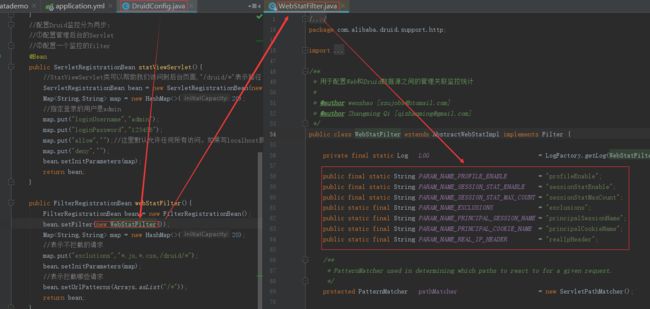
下面演示:
当我们来访问一次我们前面第一大节访问的http://localhost:8080/query时,我们可以再来查看Druid的后台如下:

更详细Druid介绍请参见:数据库连接池Druid使用总结
三.整合Mybatis
这里给一个全面的中文文档:MyBatis
1.配置相关
添加依赖:
<dependency>
<groupId>org.mybatis.spring.bootgroupId>
<artifactId>mybatis-spring-boot-starterartifactId>
<version>1.3.1version>
dependency>
这里我们准备了两个bean对象:
package com.jack.datademo.bean;
public class Department {
private Integer id;
private String departmentName;
public void setId(Integer id) {
this.id = id;
}
public void setDepartmentName(String departmentName) {
this.departmentName = departmentName;
}
public Integer getId() {
return id;
}
public String getDepartmentName() {
return departmentName;
}
}
package com.jack.datademo.bean;
public class Employee {
private Integer id;
private String lastName;
private Integer gender;
private String email;
private Integer dId;
public void setId(Integer id) {
this.id = id;
}
public void setLastName(String lastName) {
this.lastName = lastName;
}
public void setGender(Integer gender) {
this.gender = gender;
}
public void setEmail(String email) {
this.email = email;
}
public void setdId(Integer dId) {
this.dId = dId;
}
public Integer getId() {
return id;
}
public String getLastName() {
return lastName;
}
public Integer getGender() {
return gender;
}
public String getEmail() {
return email;
}
public Integer getdId() {
return dId;
}
}
然后是两个sql文件用于建表
SET FOREIGN_KEY_CHECKS=0;
-- ----------------------------
-- Table structure for employee
-- ----------------------------
DROP TABLE IF EXISTS `employee`;
CREATE TABLE `employee` (
`id` int(11) NOT NULL AUTO_INCREMENT,
`lastName` varchar(255) DEFAULT NULL,
`email` varchar(255) DEFAULT NULL,
`gender` int(2) DEFAULT NULL,
`d_id` int(11) DEFAULT NULL,
PRIMARY KEY (`id`)
) ENGINE=InnoDB AUTO_INCREMENT=1 DEFAULT CHARSET=utf8;
SET FOREIGN_KEY_CHECKS=0;
-- ----------------------------
-- Table structure for department
-- ----------------------------
DROP TABLE IF EXISTS `department`;
CREATE TABLE `department` (
`id` int(11) NOT NULL AUTO_INCREMENT,
`departmentName` varchar(255) DEFAULT NULL,
PRIMARY KEY (`id`)
) ENGINE=InnoDB AUTO_INCREMENT=1 DEFAULT CHARSET=utf8;
application.yml文件内容为:
spring:
datasource:
#数据源基本配置
username: root
password: 123456
driver-class-name: com.mysql.jdbc.Driver
url: jdbc:mysql://localhost:3306/db_course
type: com.alibaba.druid.pool.DruidDataSource
initialSize: 5
minIdle: 5
maxActive: 20
maxWait: 60000
timeBetweenEvictionRunsMillis: 60000
minEvictableIdleTimeMillis: 300000
validationQuery: SELECT 1 FROM DUAL
testWhileIdle: true
testOnBorrow: false
testOnReturn: false
poolPreparedStatements: true
#配置监控统计拦截的filters,去掉后监控界面sql无法统计,'wall'用于防火墙
filters: stat,wall,log4j
maxPoolPreparedStatementPerConnectionSize: 20
useGlobalDataSourceStat: true
connectionProperties: druid.stat.mergeSql=true;druid.stat.slowSqlMillis=500
schema:
- classpath:sql/employee.sql
- classpath:sql/department.sql
现在我们启动项目后检查建表情况:

莫急,肯定不会就是这种功能嘛,我们接着学。(现在需要把sql文件删除,防止下次再次执行)
2.基于注解的讲解
我们创建Mapper和Controller来演示
package com.jack.datademo.mapper;
import com.jack.datademo.bean.Department;
import org.apache.ibatis.annotations.*;
//指定操作数据库的mapper
@Mapper
public interface DepartmentMapper {
@Select("select * from department where id=#{id}")
public Department queryById(Integer id);
@Insert("insert into department (departmentName) values(#{departmentName})")
public int insertDepartment(Department department);
@Delete("delete from department where id=#{id}")
public int deleteDepartment(Integer id);
@Update("update department set deartmentName=#{departmentName} where id=#{id}")
public int updateDepartment(Department department);
}
package com.jack.datademo.controller;
import com.jack.datademo.bean.Department;
import com.jack.datademo.mapper.DepartmentMapper;
import org.springframework.beans.factory.annotation.Autowired;
import org.springframework.web.bind.annotation.GetMapping;
import org.springframework.web.bind.annotation.PathVariable;
import org.springframework.web.bind.annotation.RestController;
//让返回的数据不是页面而是文本数据
@RestController
public class DeptController {
@Autowired
DepartmentMapper departmentMapper;
@GetMapping("/dept/{id}")
public Department getDepartment(@PathVariable("id") Integer id){
return departmentMapper.queryById(id);
}
@GetMapping("/dept")
public Department insertDepartment(Department department){
departmentMapper.insertDepartment(department);
return department;
}
}
现在我们的department表的内容只有一条记录:
1 管理部
下面我们来演示:
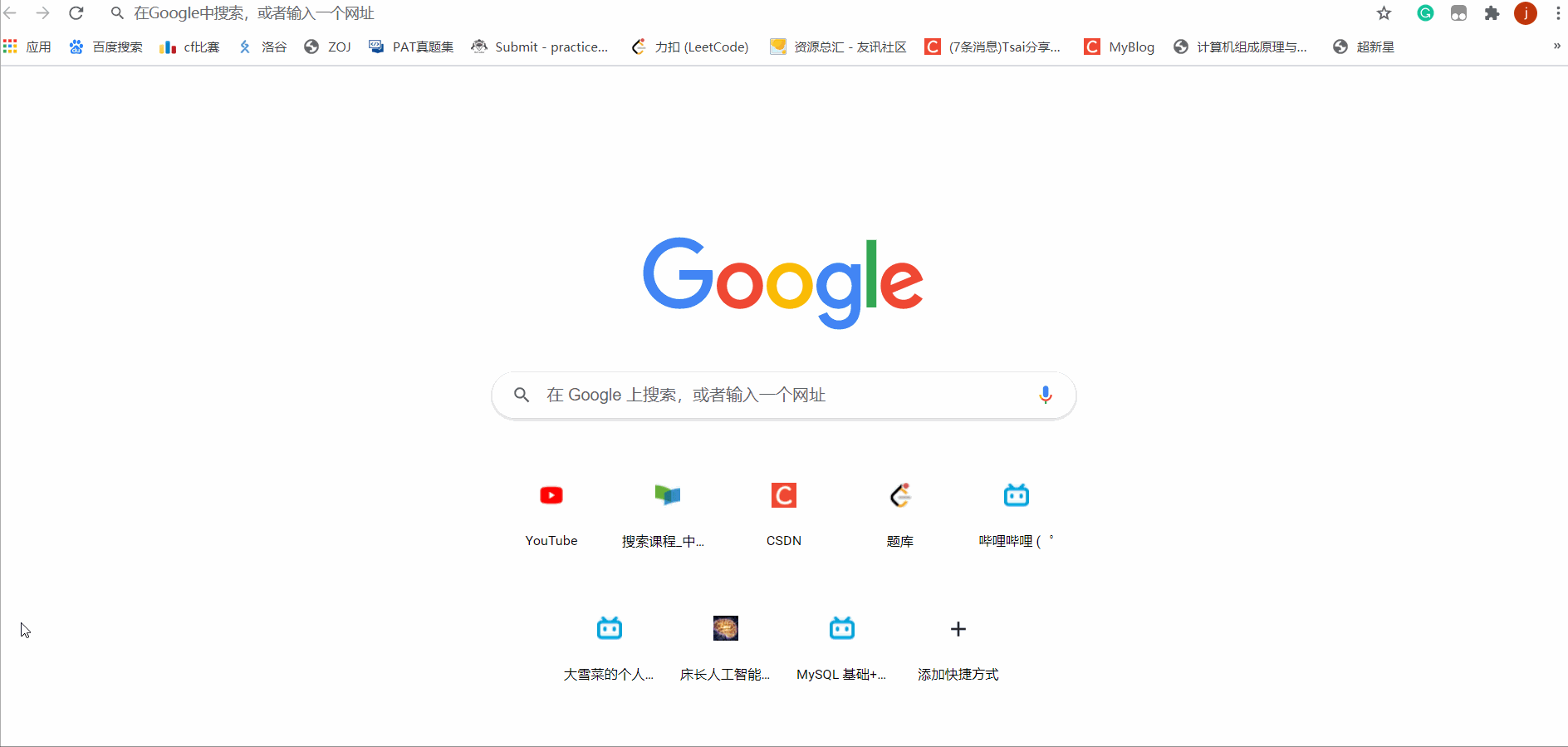
成功插入

但是在浏览器上回显的是id=null,那么我们可以这么做:
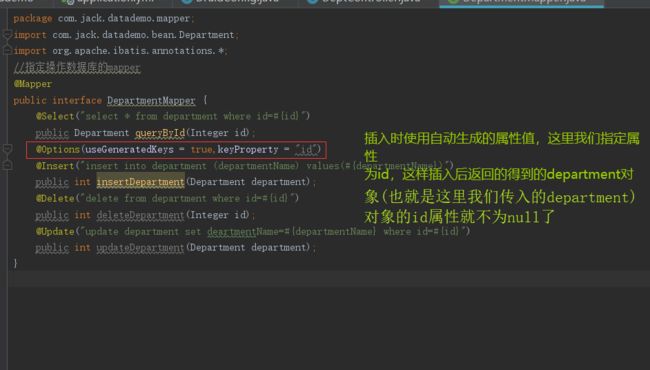

下面演示查询:
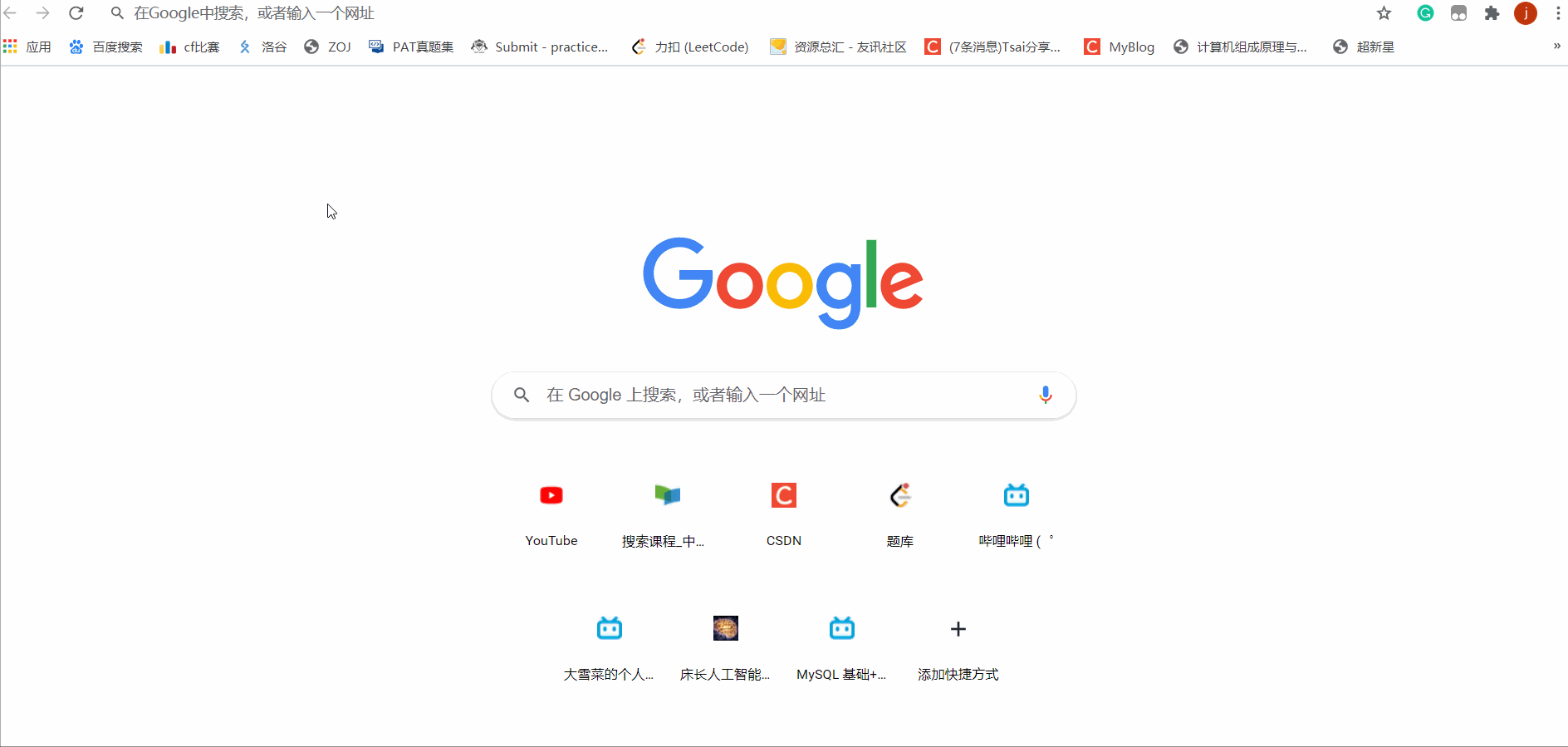
不过我们要解决一个问题就是数据库表的属性名与我们的javaBean对象的属性名不一致时如何解决(这里介绍的是开启驼峰命名法)?
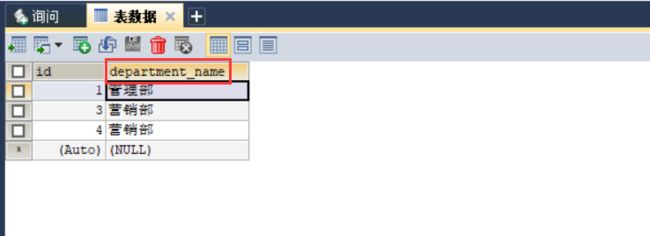
那么我们的DepartmentMapper类就应该修改为:
package com.jack.datademo.mapper;
import com.jack.datademo.bean.Department;
import org.apache.ibatis.annotations.*;
//指定操作数据库的mapper
@Mapper
public interface DepartmentMapper {
@Select("select * from department where id=#{id}")
public Department queryById(Integer id);
@Options(useGeneratedKeys = true,keyProperty = "id")
@Insert("insert into department (department_name) values(#{departmentName})")
public int insertDepartment(Department department);
@Delete("delete from department where id=#{id}")
public int deleteDepartment(Integer id);
@Update("update department set deartment_name=#{departmentName} where id=#{id}")
public int updateDepartment(Department department);
}
这里就出现了departmentName和deartment_name不一致的问题。
那么需要编写一个配置类
package com.jack.datademo.config;
import org.mybatis.spring.boot.autoconfigure.ConfigurationCustomizer;
import org.springframework.context.annotation.Bean;
import org.springframework.context.annotation.Configuration;
@Configuration
public class MyBatisConfig {
@Bean
public ConfigurationCustomizer configurationCustomizer(){
return new ConfigurationCustomizer() {
@Override
public void customize(org.apache.ibatis.session.Configuration configuration) {
configuration.setMapUnderscoreToCamelCase(true);
}
};
}
}
接下来重启一下SpringBoot应用。
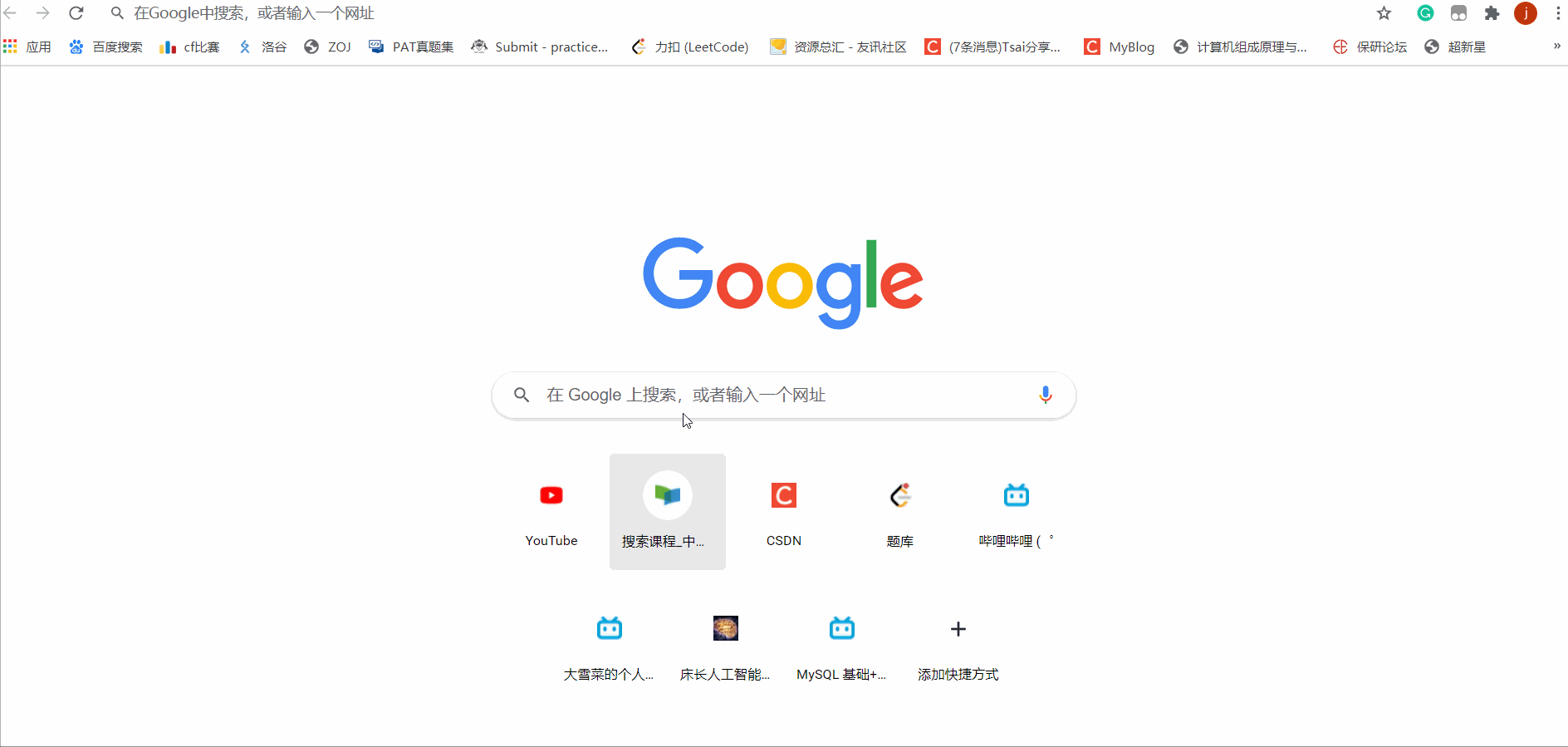
这里还要介绍一个问题,就是当做开发时如果有很多的Mapper那么我们就会把每一个Mapper都加上@Mapper注解,这样就会很麻烦了,于是我们可以这么做:

这样我们可以把之前的@mapper全部去掉,运行得到:

3.基于XML的讲解
这里我们以Employee为例子来演示。
我们相关的Xml文件的配置如下:
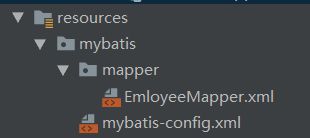
mybatis-config.xml:
<configuration>
configuration>
EmloyeeMapper.xml:
<mapper namespace="com.jack.datademo.mapper.EmployeeMapper">
<select id="getEmployeeById" resultType="com.jack.datademo.bean.Employee">
select * from Employee where id=#{id}
select>
<insert id="insertEmployee" parameterType="com.jack.datademo.bean.Employee">
insert into Employee values(#{id},#{lastName},#{email},#{gender},#{dId})
insert>
mapper>
我们的Mapper类为:
package com.jack.datademo.mapper;
import com.jack.datademo.bean.Employee;
//这里需要填@Mapper,也可以是在主应用程序上加上@MapperScan,这点是必须的
public interface EmployeeMapper{
public Employee getEmployeeById(Integer id);
public void insertEmployee(Employee employee);
}
最后编写EmployeeController来测试:
package com.jack.datademo.controller;
import com.jack.datademo.bean.Employee;
import com.jack.datademo.mapper.EmployeeMapper;
import org.apache.ibatis.annotations.Options;
import org.springframework.beans.factory.annotation.Autowired;
import org.springframework.web.bind.annotation.GetMapping;
import org.springframework.web.bind.annotation.PathVariable;
import org.springframework.web.bind.annotation.RestController;
@RestController
public class EmployeeController{
@Autowired
EmployeeMapper employeeMapper;
@GetMapping("/emp/{id}")
public Employee queryEmpById(@PathVariable("id") Integer id){
return employeeMapper.getEmployeeById(id);
}
@Options(useGeneratedKeys = true,keyProperty = "id")
@GetMapping("/emp")
public Employee insert(Employee employee){
employeeMapper.insertEmployee(employee);
return employee;
}
}
最后需要在application.yml文件里面配置:
mybatis:
#指定全局配置文件的路径
config-location: classpath:mybatis/mybatis-config.xml
#指定特定mapper的配置路径
mapper-locations: classpath:mybatis/mapper/*.xml
测试得到发现dId为空

这出现了我们在讲注解是出现的表与bean属性名不一致导致的问题,由于我们之前配置的MybatisConfig并不对XML方式来起作用,我们可以这样解决:
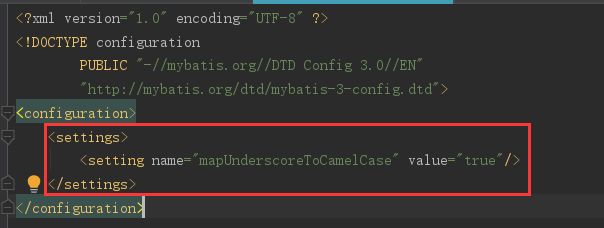
再次测试:

不过这里要说明的是:如果没有我们的MybatisConfig,这里的xml配置也可以保证解决我们对dempartment的访问也不会存在驼峰命名不匹配的问题。


